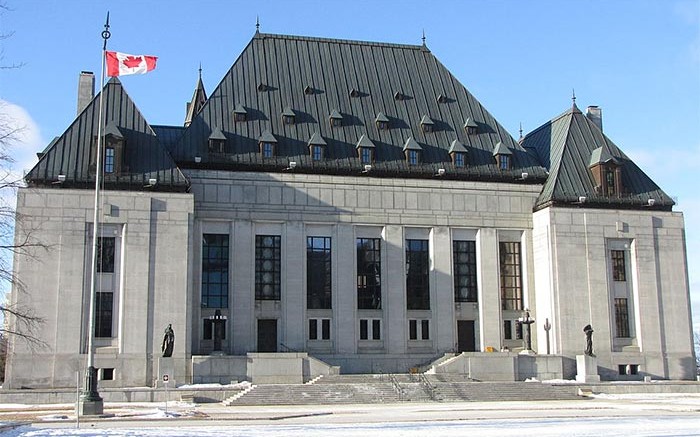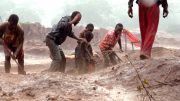Pipelines, energy exports, fracking, clear-cuts, tailings ponds and access to resources are daily in the news as the industry faces pushback on traditional lands from natives who feel that their way of life is threatened. But what’s different now is that the tone of the dialogue is changing — and not necessarily for the better.
For example, here is a quote from Northern News of Gino Chitaroni, president of the Northern Prospectors Association, recently speaking in Kirkland Lake, Ont.: “We are now at a crossroads, where our whole industry and way of life is completely threatened … the empowerment of First Nations at the expense of the mining and exploration industry … this is a massive sleeper problem that nobody wants to talk about in the press, because those who do may be targeted for reprisals and branded bigots and racists.”
We’ve seen a lot of court-bashing in the Canadian media from think tanks, former politicos and a former media tycoon. But the fact is that the native legal winning streak has rolled out in a highly consistent fashion. Indeed, it’s the courts themselves that have promoted the need for constructive dialogue for over 15 years now, based on the poignant closing in Delgamuukw, wherein the Supreme Court admonished one and all by writing: “Let us face it: we are all here to stay.”
Unfortunately, resource-centric governments have continued to do their talking in the court, with devastating results. Because today, after amassing 200 legal wins (I’ve been keeping track), Aboriginal Peoples are well on their way to redrawing the map of Canada not only at the resource sector’s expense, but also at the expense of the national economy.
Here are five reasons why Canadians should care about this trend, and have that long overdue discussion on access to resources.
1. Aboriginal Peoples as ‘Resource Rulers’ — In regions of Canada with significant aboriginal populations, there will now be little resource development without Aboriginal Peoples wholly onside. It’s unfortunate that the rise of native empowerment has gone so completely unacknowledged in the corridors of power, because all this has been happening in plain sight, and with predictable regularity. Canadians now need to appreciate the power consequences of living in a country with an emerging class of resource gatekeepers whom I call “Resource Rulers.” Yet rarely do corner-office denizens acknowledge their existence, lest they be associated with having “lost one” somewhere in the hinterland. Thus the legal drumbeat continues.
2. Redrawing the map of Canada — Huge swaths of the country’s potential resource bounty north of the Trans-Canada Highway are already under de facto native control, given the geographic spread of the winning streak; the comprehensiveness of the resultant case law; and the strategic manner in which natives assert their constitutionally protected rights. Today natives are determining the outcome of important resource initiatives and national infrastructure projects in every province — for better or for worse.
Fracking bans in the Maritimes, anti-uranium marches in Quebec and land-use planning in Yukon are but three concurrent outcomes over access to resources. The courts are just one component of the indigenous rights strategy, which also includes skilled negotiations and manifestations of on-the-ground power (as five burning police cruisers bore witness on the road to Rexton, N.B., in October 2013, as collateral damage of a shale-gas clash between local natives and SWN Resources). Paradoxically in the era of Google maps, it’s still natives who guide the way on the road to resources. The country needs to accept this as the new economic reality.
3. The statistics for B.C. — I recently presented my case law research at a legal conference in B.C.’s resources sector, citing 12 reported resource rulings there this year, of which natives had won 10 and lost two. Tellingly, two of the native wins involved projects (a mine) and issues (tree farm licences) that had already been clarified at the Supreme Court of Canada. Apparently this is what passes for business as usual in the B.C. resources sector, where industry proponents continue to litigate and to lose — paradoxically just when a rapprochement is most needed, and as new projects tumble into the legal blender (e.g., B.C.’s Hydro Site C dam is already drawing several legal challenges).
4. 180-degree outcomes — New Brunswick politics has just purged itself of the messy and dangerous native pushback over fracking. Last September’s provincial election was a de facto referendum on this contentious extraction process, and the result saw the Alward Government go down to a one-term defeat. An anti-fracking moratorium is on its way into law, with the region’s leading eco-activist winning the former Minister of Natural Resources riding. You could not find a more 180-degree opposite outcome in Canadian politics, and it was the native showdown on the road to Rexton that brought this result about. Native pushback decided the fate of that government.
5. Partners in nation-building — On a more positive note, at a recent mining conference in St. John’s, N.L., I witnessed a glowing testament to the benefits arising from Vale’s Voisey’s Bay nickel mine in Labrador. This is important to me since I was a strategist for Inco in winning native support for development of that project, which at the time was hugely conflicted.
Here’s what a Labrador native leader, Minister Darryl Shiwak of the Nunatsiavut government, is saying a decade later to miners: “We’re guaranteed to return your calls, we’re open to discussion, we want a mutually beneficial relationship, and to that end we’ll troubleshoot your problems and fast-track your exploration plans … we’re 44% of the permanent workforce, so this project has been extremely beneficial for us. Our Impact and Benefit Agreement is a permanent mechanism based on mutual respect and cooperation, it’s meant to be a living and breathing document. We too have obligations under the IBA, and realize it provides security for both sides. We’re working to reduce barriers and promote industry”
Today everything that has succeeded at Voisey’s Bay — the open-pit mining of the Ovoid; going underground; and the recent commissioning of Vale’s hydromet plant in Long Harbour, N.L. — are the very same things that have since crashed and burned in Ontario’s Ring of Fire, making one obvious difference between success and failure: native endorsement of the project.
It doesn’t have to be this way.
The missing ingredient is political statesmanship. Until such time as governments and industry wake up to the fact that natives are strategically controlling resource outcomes, and the rest of Canada decides to meet them halfway on the road to resources, nothing will really change — except for the number of wins propelling the native legal winning streak to its next benchmark.
— Based in Waterloo, Ont., Bill Gallagher, LL.B., is an experienced strategist in the dynamic area of native, government and corporate relations, and an authority on the rise of native empowerment in the Canadian resources sector. He is author of Resource rulers: Fortune and folly on Canada’s road to resources. Please visit www.billgallagher
.ca for more information, book excerpts and his blog.






All this and more was described — as Canada’s biggest challenge going forward as a nation-state because the constitutional benefits to First Nations have been ignored — throughout my 2013 book “Merger of the Century: Why Canada and America Should Become One Country”.
Also I recommend reading:
http://business.financialpost.com/2014/11/29/canadas-unfinished-business-with-first-nations-is-an-economic-failure/
Diane Francis, Editor at Large National Post
I have read items by and about Bill Gallagher’s research and conclusions before. Mr Gallagher is assuredly the John the Baptist of the Canadian resource sector; repeatedly laying out reality for the mining and oil exploration companies only to see them ignore his advice and trip up yet again.
Mr Gallagher really should have a front page, business section interview with Canada’s major print media and for that matter on The Exchange with Amanda Lange, C B C. Heeding his insights would save a tonne of grief—-not to say cut a loy of legal bills.
Robert P Kennedy
Metier & Associates
Mr. Kennedy should know that nothing of negative nature will be printed in the Globe and Mail {Aboriginal Affairs}. Just read a few issues. Mr. Gallagher, like all of us, are having a very difficult time informing the public {Toronto} of the serious consequences derived from the “consult and accommodate” legislation. All new projects have been stopped, not just those of the mining sector. Because of free legal service, the aboriginals probably employ 10% of the profession.